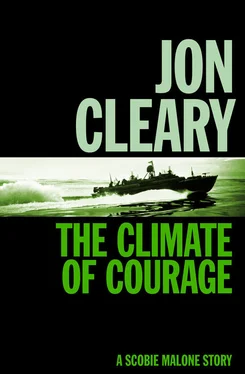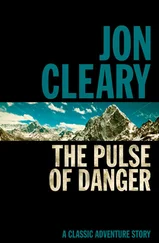He took a cigarette from a packet flipped it into the air and caught it between his lips. He was full of such small vaudeville tricks: he should have gone on the stage instead of on to the clerical staff of the Water Board. In the Middle East he had even made the Arabs laugh with his antics and more than once had stolen the show from a street magician. He loved to be the centre of interest, but no one, except possibly the street magicians, had ever resented his conceit. It was hard to resent anything about Greg Morley.
He lit the cigarette, then abruptly sat up straight. “Where are we now?”
The lieutenant beside him turned from the window. “Relax, she won’t mind if you’re a little late. Haven’t you kept her waiting before?”
“Not two bloody years.” His voice was quick and light: a laugh lived in his throat. “And I’ll bet there’s a Yank just waiting for me not to turn up.”
“Two years,” said Vern Radcliffe. “I’m going to notice a difference in my kids.”
“Just so long as there’s none in the wife, that’s the main thing.” Morley grinned, then impatiently dropped his cigarette to the floor and ground it out with his boot. “Sometimes I used to be scared that by the time we got back I’d be too old.”
“You’ll never be too old for that or anything else,” said Radcliffe, and looked at Morley with affection. “You’ll be one of those eternally young bastards.”
Morley laughed again, glad and proud of his youth. He was twenty-five, but Radcliffe was right: he would never be old. Age never shows on water.
Radcliffe turned and looked out of the window. He was a thick-set man who looked short sitting down but would be of medium height when he stood up. His face was the type that is square when the man is in condition but is round when he falls into fat; the corners were a little soft now after the long lay-off on the journey home from Tewfik. His brows and moustache were thick and ginger and his hair lay like a heavy auburn pelt on his well-shaped head. He had a certain animal look, amiable but not finely bred. Some day when he had slowed down and all the corners were round he would remind people of a sleepy old bear. But now there was still strength and a hint of controlled quickness in him, something that appealed to women who met him; if later they were a little disappointed in him it was because they found there was also a good deal of caution in him. The unit thought him a good officer.
The train sped on: Sydney came up out of the past at fifty miles an hour. Stations rushed backwards out of sight: now there wasn’t far to go on the journey towards home.
It had been a long journey, beginning almost two years ago, in the winter of 1940, when the last farewell had been said; and it had included an ocean twice crossed, a desert, mountains, and these last two days the hills and plains they knew so well. They had boarded the train at Adelaide and had passed through Melbourne, and every mile had brought another remembrance. There had been the wide brown paddocks, the horses curving away in white-eyed fright like the chargers on a carousel, the nude corpses of the murdered gums, the shifting grey billabong that had turned into a mob of sheep, and the drab towns whose only beauty was the friendliness one knew one would find in the houses. The last stage of the journey had been the shortest and yet the longest, but above all the best.
There had been little to see at night, but Australia had been there outside the train. Some had stared out the windows seeking the Southern Cross, but the engine smoke had blown like a cloud across the sky. The train’s whistle had wailed across the dreaming countryside: somewhere an echo had been evoked in a heart and someone had felt the chill of sadness. Houses, windows of cats’ eyes, had crouched in the lee of invisible hills; a town had spun away, spangled with lights, beautiful at last in the darkness. Then the world had fallen past the moon and there had been the pale landscape stretching away as far as the eye could see and the heart remember: the hand of home had reached out and touched the sleeping brain, and the men, disturbed, expectant and yet frightened, had turned over to face the darkness of the racing train. In the morning their loneliness and their fear had been forgotten in their excitement.
Now they were almost home. The city closed about them and everything was suddenly, startlingly familiar. A church a bridge, even the posters on the hoardings were the same: Ginger Rogers smiled invitingly, Tooth’s KB Lager was a Man’s Drink; and the men wondered what had ever attracted them to brothels and arrack. There was the black smudge in the clear day, the railways workshops at Eveleigh overhung with their fog of soot; and for the first time the men saw them as a target and felt a sudden emptiness, as if they had seen an old friend stricken with an incurable disease. Redfern Station went by, the men’s shouts echoing back as part of their own welcome; the tracks multiplied, spread out like the silver flood of a river; and at last there was the tall clock tower of Central Station, the landfall they had all been waiting for. The train began to slow.
“I’ll lay five bob he pulls her up out here in the middle of nowhere. There! What did I tell you?”
“Hey, Mr. Radcliffe, go up and pull your rank on the engine driver. You must wanna get home as much as us.”
Vern Radcliffe turned from the window and smiled at the smiling faces. Good humour lurked constantly at the corners of his wide mouth like another, intangible feature; sometimes his good humour had been taken too much for granted and he had had to convince a few of the men that he also believed in discipline. But not now: the men didn’t need discipline this day. He smiled at them, then looked at Greg Morley, who shook his head and rolled his eyes downwards.
Radcliffe caught the hint. “Where’s Sergeant Savanna?”
“Here, sir.” Sergeant Savanna was stretched out on the floor, his head pillowed on a kit bag; he made no effort to lift his long bony frame into an upright position. “Always on hand for the call of duty.”
Like Radcliffe and Morley, Jack Savanna had come out of the ranks of these men and some of the old relationship still remained. But when it was needed, he could be as tough as any permanent army N.C.O. He was a born leader who had continually held back his own promotion by getting into scrapes; his waywardness was not a result of weakness, like Morley’s, but of a stubborn streak of rebellion in him. He had been reduced from a sergeant to a corporal twice, and had only been repromoted because he was so much better than anyone else available. But he had been born to lead revolutions, not the forces of tradition; had he been born a hundred years earlier he would certainly have had a say at the Eureka Stockade. He looked up at Radcliffe, one of the minor pillars of tradition. “You wanted me, sir?”
“Go up and tell the driver to get a move on,” said Radcliffe, enjoying the feeling of good humour that pervaded the carriage. “Private Brennan wants to get home to his girl.”
“Plural, sir,” said Private Brennan. “I’ve got seven of ’em waiting.”
“That makes it even more urgent, sergeant,” said Radcliffe.
Sergeant Savanna didn’t stir. “Corporal Talmadge.”
“Here, sarge.” The tall man with the close-cropped prematurely grey hair, turned from the window; there was no look of expectancy on his leathern face, he had another three hundred miles to go before he would see home. “Want something?”
“Go up and tell the driver to get a move one. Private Brennan wants to get home to his harem.”
Corporal Talmadge hadn’t been listening to the conversation, had been completely isolated from it by his own thoughts, but he moved immediately into the joking intimacy of the rest of the men. “Private Brennan.”
Читать дальше












